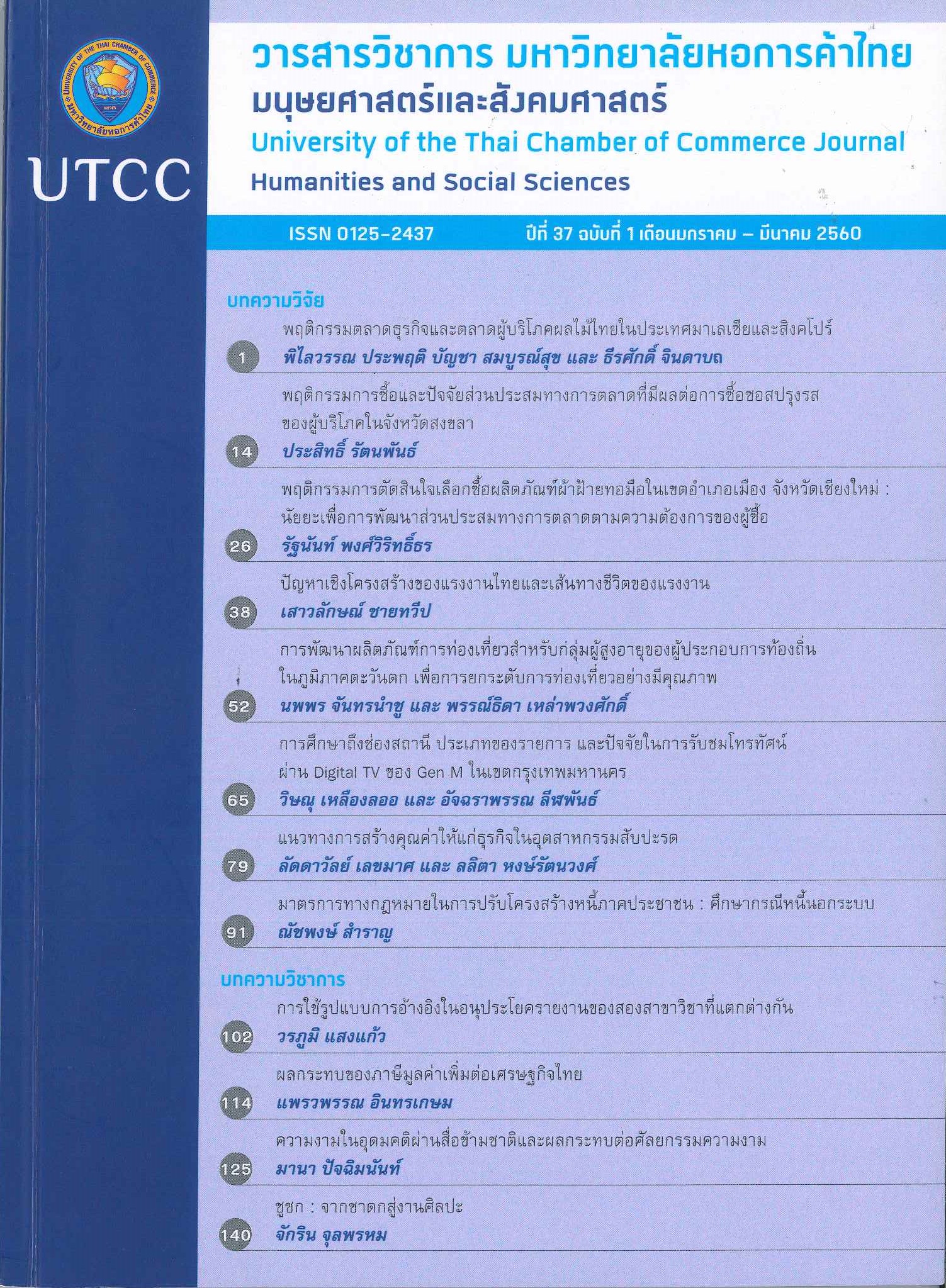The Structure of Thai Labour Problems and Worker’s Life Trajectories
Main Article Content
Abstract
This research aims to investigate 1) the Thai labour market both formal and informal labour market 2) life trajectories of the workers and rural –urban labour employment situation. The research methodology compose of documentary research, indept-interview and focus group discussion with the workers in Chiang Mai and Lamphun provinces. The research results show that the economic development which based on neo-liberalism of free trade, regulation of public organizations and privatization, has led to enormous changes of labour employment in the forms of short term employment, subcontracting and so forth. This trend of labour employment has occurred in the transition of industrial capitalist accumulation in Fordist regime. In early 1970s, the problems of high potential productivity of Fordism came to crisis caused by several factors such as the strict rule of labour process and production as well as labour control. Furthermore, the large-scale production needs a large number of investment. As a result, the factories have adopted a new strategies of flexible production and labour employment. This research reveals that the spatial dimensions of socio-economic development in urban-rural areas reflects life trajectories of labourers in agricultural sector to industrial sector and post industrial sector to other forms of career path in rural economic development.
Article Details
ลิขสิทธิ์ของบทความ
ผลงานที่ได้รับการตีพิมพ์ถือเป็นลิขสิทธิ์ของมหาวิทยาลัยหอการค้าไทย ห้ามมิให้นำเนื้อหา ทัศนะ หรือข้อคิดเห็นใด ๆ ของผลงานไปทำซ้ำ ดัดแปลง หรือเผยแพร่ ไม่ว่าทั้งหมดหรือบางส่วนโดยไม่ได้รับอนุญาตเป็นลายลักษณ์อักษรจากมหาวิทยาลัยหอการค้าไทยก่อน
References
Amin,A (1997).Post-fordism: A reader. Malden, MA: Willey- Backwell.
Chaytaweep, s.(2006). Industrialization and the discourse of labour process in Thailand: reflections on women outworkers and flexible production in the Chiang Mai
Region.(Unpublished doctoral dissertation). LaTrobe University, Melbourne.
Harvey, D.(2006).Spaces of global capitalism : Towards a theory of uneven geographical development. London: Verso.
Harvey, D. (2007). A brief history of neo- liberalism.New York NY: Oxford University Press.
Hongburin, A.(2010). China's policies on foreign investment liberalization after its entry into WTO: Facts or disguise University of the Thai Chamber of Commerce Journal,30 (2)ม 141-152.
International Labour Office. (2004). Thailand social security priority and needs survey. Bangkok: Author.
International Labour Office. (2007). Global employment trends brief.Retrieved July 27,2016 from https://www.ilo.org/public/portugue/region/eurpro/lisbon/pdf/global_trends_2007.pdf.
International Labour Office. (2011). Global employment trends: The challenge of a jobs recovery. Geneva:Author.
lnternational Labour Office.(2012). Statistical update on employment in the informal economy. Retrieved May 25,2016 from https://laborsta.ilo.org/applv8/data/Informal_economy/2012-06-statistical%20vupdate%20-%20v2.pdgf
Kidnukorn,S.(2011). Negotiating meanings of work in agro-food industry: A case study of frozen food workers in ChiangMai Provinces. (Unpublished mastere's thesis). Chaingmai University. (in Thai).
National Statistical Office. (2012). The 2011 household socio-economic survey whole kingdom. Bangkok: Author. (in Thai).
Pichaisanit, E.(2010). Economic alternative on welfare state. Bangkok: Openbooks. (in Thai).


